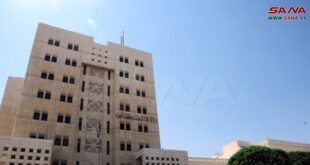Hasaka, Deir Ezzor, SANA- Wildfire has roared through vast areas in Hasaka and Deir Ezzor provinces as it has consumed wheat and barley crops, inflicting heavy losses upon farmers who had worked in their farms for several months to guarantee their livelihood.
The high temperature has not been the only reason behind the eruption of fires as many locals point an accusing finger at Qasad Militia and the remnants of Daesh (ISIS) terrorists as they hold them responsible for the eruption of fire in different areas across the two provinces.
About two weeks ago, when the harvest season of wheat and barley crops started in Hasaka province, fires started to devour all the farms in their path as tens of fires have grown to about 70 thousand dunums and they have devoured about 18 thousand tons of wheat and barley taking into consideration that the cultivated area in the province in general reached up to 910 thousand hectares.
The phenomenon of fire eruption is considered the first of its type in Hasaka as the high temperature is not something new in the province, according to Assistant Director of Hasaka Agricultural Department Rajab al-Salameh.
Al-Salameh affirmed to SANA reporter that such phenomenon hasn’t took place in the previous seasons with regard to the spread of fires and the affected areas as fires used to be limited and the reasons behind them have been clear over the past years.
Daham al-Sultan, a farmer from Hasaka, talked about the suffering of farmers as most of them haven’t harvested their crops yet, adding that the fires are out of control as they can’t be extinguished by the locals through primitive ways in light of the hurdles created by some parties which control the area.
Al-Sultan went on saying “Fires grew to an area of 2500 dunums which had been planted with rainfed barley and wheat in Rajm Farhan village in Hasaka eastern countryside and it devoured our farms.”
He indicated that fires had been controlled in the rest of areas by the locals who used their agricultural tractors and private water tanks as the required ways for extinguishing fires such as fire engines and others are not available in the areas were fire erupted.
On June 1st, farmers started to harvest and market wheat crops for the current year as the season seemed to be promising, yet fires which has raged through vast areas made them live in a state of anxiety despite of all the taken measures by the state for controlling these fires.
Local sources in Hasaka province pointed an accusing finger at members of Qasad militia for committing arson within their policy which aims at exerting pressure on the locals and preventing them from handing their crops to the governmental centers.
The situation of Hasaka farmers is not very different from those in Deir Ezzor province, particularly in the areas which are controlled by Qasad militia where fires were set to vast fields intentionally as the locals directly accuse Qasad militia and Daesh sleeper cells of committing arson there.
Abu Mohammad, one of the locals of Sour City in Deir Ezzor northern countryside, says that fires which have been set to many areas in the province have devoured hundreds of hectares planted with wheat and barley crops.
Abu Mohammad accused Qasad militia directly of setting fires to wide areas as it was choosing the farms of the families which reject to deal or obey its orders and it set fires to them to punish those families.
Locals believe that Qasad militia seeks through setting fires to the agricultural farms to prevent farmers from benefiting from them because they reject to sell their crops to the militia and to force them to join their ranks as it would be the only way for guaranteeing their livelihood.
Elderly Abu Mukhlef, a farmer from al-Hussan village in Deir Ezzor northwestern countryside, indicated that most of the fires have been intentionally set to the farms by the remnants of Daesh terrorists and their sleeper cells to inflict the biggest possible damage on farmers and the locals who have rejected to join their ranks.
Ruaa al-Jazaeri
 Syrian Arab News Agency S A N A
Syrian Arab News Agency S A N A

